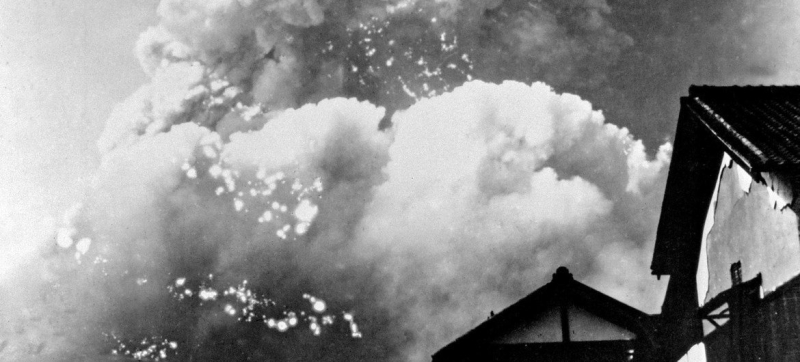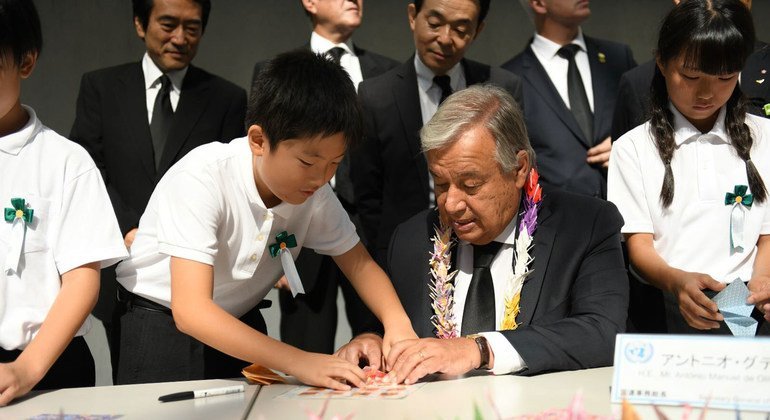
8:17 am, an atomic cloud exploded over Hiroshima, 2 minutes after the explosion. INTERVIEW | How young people shape nuclear disarmament policy Sustainable Development Goals
Galina Salnikova’s interest in nuclear disarmament and non-proliferation issues appeared in high school, thanks to one of her teachers. In addition to her main job at the UN Permanent Representative’s Office in Vietnam, where she coordinates youth policy, Galina actively participates in various projects and conferences on nuclear issues. Before moving to Hanoi, she helped the UN Office on Disarmament create educational courses and developed a program to develop the potential of young activists as a consultant.
Ahead of International Youth Day, celebrated on August 12, Evgenia Kleshcheva spoke with Galina about why she decided to work on nuclear policy issues and how other young people can get involved in this important work.
The text of the interview has been edited for clarity and brevity.
EK: I understand that you started working in this area while still in school. How did you come to such an interest??
GS: This is a very interesting story, especially in the context of the UN, because in the Office for Disarmament Affairs (UNODA), and in the nuclear field in general, a lot of attention is paid to education.
Since 2004, my English teacher has been taking students to a conference of the James Martin Center for Nonproliferation Studies in America. It was called the Critical Issues Forum. The program was attended by high school students from America, Japan, and Russia. In Russia, these were students from closed cities associated with the nuclear industry. My teacher’s goal was, of course, to broaden their horizons, but also to learn English. At the same time, this topic really touched me personally. I was in the 10th grade at the time, and I had to choose what to do next.
I realized, looking at those who work in this field and are truly passionate about their work, that this could be a very cool path in life. Then I was in the city of Nagasaki at a youth forum under the auspices of the Japanese Ministry of Foreign Affairs. And so, little by little, on different projects, I eventually came to my master’s degree and already professional activity for several years on this topic.
EK: Why is it necessary and important for young people to participate in such serious topics?
GS: No matter how primitive it may sound, the future is in our hands, because in the future we will be the ones who sit in management positions. You need to know from a young age what is happening in this world. Nuclear risks and the agenda associated with the “nuclear” and disarmament in general are very important. People think that it doesn’t particularly apply to them, but in fact, this agenda is relevant to any part of society.
Read also:
The UN Secretary-General called for a fight back against those who “again recklessly brandishing a nuclear saber”
On the other hand, now I see young people as having such a social drive. Social networks are mainly filled with young people, and in general the information agenda is created by young people. It is clear that some important decisions are made by older generations, but youth shape the discourse.
Shaping discourse is especially important in the area of disarmament now because people have forgotten what it’s like to actually have weapons around every single day. After World War II, people clearly felt this fear of nuclear disaster, especially after Hiroshima and Nagasaki. Now we see nuclear weapons as something ephemeral, something non-existent, because they are completely in the hands of the state. But if, God forbid, something happens, it will affect absolutely everyone.
EK : And what projects or plans for the future are there now related to this issue and youth?
GS:It is very important to note that although the field of disarmament is quite technical and it seems that you need some kind of related education to actively participate in it, in fact, this is not entirely true, because you can have absolutely any background, absolutely any field of activity to participate. And I am not talking here about something related to international relations, but simply to the point that you can be an artist, you can be a designer, you can be an IT specialist, an engineer, anyone and really make your contribution to this field.
Why? Because there are a lot of different projects of different formats. For example, there are regular competitions for creative works. For example, under the auspices of the Comprehensive Nuclear Test Ban Treaty Organization. There are UN projects that are currently in progress. These are the “Young Champions of Disarmament” – UN Youth Champions for Disarmament. There is also a focus on the fact that guys with completely different backgrounds discuss this topic together and form projects.
If there is interest in To participate in something like this, I advise you to follow the social networks of the Office for Disarmament Affairs: United Nations ODA (UNODA) and Youth for Disarmament. On August 30, they are organizing a youth conference on nuclear disarmament in a hybrid format, in which anyone can participate.
In addition, there are global campaigns . For example, Cranes for Our Future are paper cranes inspired by the story of a Japanese girl who developed leukemia after the bombing of Hiroshima.

And August 29 will be the International Day against Nuclear Tests. This is the anniversary of the closure of the Semipalatinsk test site. And there is a global campaign Step Up for Disarmament – “walk for disarmament”. You need to walk or run 8.29 kilometers, that is, like the date of August 29. You can register on the website, get your number, like in a marathon, print it out, walk with it, take a photo, and so on. And this format of participation is very valuable.
EK: Are there any specifics in Russia and the countries of Central Asia, Eastern Europe?
GS: This is a very good question. It is important to understand that, like international relations in general, the discourse around nuclear weapons and nuclear policy is very Western-centric.
And now there is a real problem that many people in Russia and in the Central Asian countries are working on, that there are very few initiatives and projects in Russian. That is, if you are a student of international relations in Russia and really want to actively participate in this topic, you cannot do without English, unfortunately. Even I myself, in the 10th grade, when I was at a conference, I immediately studied everything in English. It was very difficult for me, because my English was not at an adequate level at that time.
Another interesting specificity about Russia and the post-Soviet space is that Russia itself is a nuclear state. And the Soviet Union was the second state in history that was able to produce nuclear weapons. And therefore, the discourse has mainly been formed all this time not from the side of disarmament, but more from the side of non-proliferation, that is, these weapons will exist, but they should not fall into the hands of those who can approach them irresponsibly or aggressively. At one time, nuclear weapons were invented quickly, in principle, because they were afraid that Germany would be the first to invent them, and the world would, so to speak, literally explode.
There are not many initiatives in Russia, but they exist, and this is very important. The discourse is mainly very scientific. Here I would really like to highlight the PIR Center. This is the spirit of education: young people need to first know what is happening and know the agenda before they take any active actions in it. And the PIR Center has online courses in Russian that are available to the general public of any age. They also hold an annual summer school on non-proliferation. And they generally publish quite a lot in Russian, including.
In addition, in Russia, the Center for Energy and Security organizes a conference on non-proliferation, which in recent years has had a youth segment.
There is also, for example, a summer school at the Odessa Non-Proliferation Center. It is quite global in its scope, a lot of guys from Europe, America, and so on participate there, because it is in English. In Kazakhstan, there is a wonderful organization called STOP – Steppe Organization for Peace. These are guys who focused on the Semipalatinsk nuclear test site, which was closed in the 20th century. But there are still traces of radioactive contamination there. Having started with global initiatives, they came to Kazakhstan and said: let’s still formalize this into something more significant.
I would like to introduce more disarmament into the Russian discourse, that is, to talk about the fact that, perhaps, it is better for nuclear weapons and weapons of mass destruction not to exist at all. Why live in a world where they exist? The lowest risk would be if they did not exist at all.
EK: Finally, what would you like to say to today’s schoolchildren and students??
GS: I want to say that in our time it is important to be aware of different agendas. And just like climate change, the disarmament agenda is just as important. And they are actually very closely related.
Please don’t think that this is something very distant, something too technical.
Be interested and remain concerned. These are key points that we all need to support in any area, not just disarmament.
Everyone can contribute, even just by being aware of what’s going on. There are a lot of resources out there that you can use, both entertaining and regular. There are a lot of great movies. I recommend watching “The Man Who Saved the World.” There are a lot of different documentaries and TV series that touch on these topics. So you can start with this and then watch what interests you. And if you suddenly want to learn more, I really recommend the UN Office for Disarmament Affairs Disarmament Dashboard. There are many beginner courses to raise your awareness of this topic.
So, to summarize, be interested and remain not indifferent. These are key points that are important for all of us to support in any area, not just disarmament.
